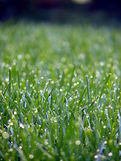Organic Lawn Care
|
Mowing and watering are lawn care essentials. Organic lawn maintenance methods can help keep the lawn green without using pesticides and fertilizers.
|
|
|
Lawn Care the Organic, Earth-Friendly Way
Organic lawn care is safe and effective. Many people choose it as a good alternative to using pesticides, herbicides and commercial fertilizers. Using organic methods can help create a deep, soft, green blanket of grass. A healthy, organic yard is safe for family, children, pets, squirrels, and birds. Plus, Earth-friendly lawn care causes no harm to the water supply and the environment.
Lawn Mowing for Healthy Grass
Mowing the lawn is good for keeping grass healthy. Growing good grass also depends on soil quality, depth of topsoil, and amount of sunlight on the lawn. Of course, mowing can’t be put off and it is the first line of approach. There are a few basic guidelines to mowing for a healthy lawn.
In fact, mowing the lawn frequently can help keep back weeds. The new growth in grass spurts from low on the grass blade while the new growth in most weeds is high up in the plants. Mowing frequently keeps the growing heads off the weeds but gives the grass opportunities to grow hardy. Cutting Grass to Keep Back Weeds Grasses and weeds are in competition for the sun. Sunshine is needed by all plants and allows them to make food. Shade is bad for most grasses and weeds. So, either the grasses are long and shade the weeds out, or the weeds will grow high and end up shading out the grass. Another good practice in lawn care is to mulch the cut grass back into the lawn. Use a mulching mower or simply leave the bag off a conventional mower. It’s not only possible, but also a good idea to leave the clippings on the lawn. The cut grass returns organic matter, nitrogen, and other nutrients back into the soil. Mulching does not damage the grass or create thatch. When grass is mulched there is less need for adding organic fertilizers and it also keeps bagged grass out of landfills. Grass cuttings can be composted and the compost added back into the lawn. But simply letting the cuttings lay where they fall is much easier and less labor intensive. Watering Lawn Grass A lawn needs to be watered if there is not enough rainfall or moisture available. The amount of watering is dependent on the dryness of the region. Dry climates obviously need more watering than damp climates. However, lawns can benefit by drying out between waterings. Deep watering, done less frequently is the key to a healthy lawn. Lawn watering is best to do in the morning. Water it in about an inch deep or for an hour long. Infrequent watering, about once a week, encourages grass roots to grow longer because the grass must reach down deep for moisture. Watering correctly and mowing high work together to accomplish the following:
Lawn Care Without Chemicals or Pesticides Mowing and watering are the critical points of lawn care. What more can be done to keep the lawn healthy and green? Feeding and weeding the organic lawn are also essential practices. These two things can also be done organically, without chemicals or pesticides. |
|
Author: Karla Beatty
|
|
The green revolution is leading more people into organic gardening practices. Lawn maintenance using organic methods is a viable alternative that keeps the grass green and healthy. A wide, lush lawn is a beauty to behold.
|
Comments
Have a response to the SimpleTens article Organic Lawn Care?
Add your questions or comments here.
Add your questions or comments here.

